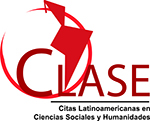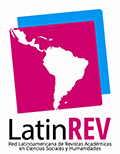Can Organizational Theory Change Realities, or Is It Only Useful for Writing Papers?
A Concrete Application: The Cruz del Sur Institute
Abstract
This article analyzes the case of the Cruz del Sur Institute, a socio-educational initiative in the Autonomous City of Buenos Aires that has incorporated tools from organizational theory to strengthen its institutional development. Through a theoretical and contextual approach, the study examines its organizational praxis to identify key lessons applicable to other contexts and similar projects. The objective of this work is to offer an applied contribution based on an experience rooted in the territory, with the intention that the lessons learned may be transferred and adapted to other cases and contexts with similar characteristics. Additionally, the article highlights the importance of fostering dialogue between theoretical proposals from the academic field and practical experiences developed in the social sphere.
Downloads
References
Binkerhoff, J. (2002). Goverment–Nonprofit Partnership: a Defining Framework. Public Administration and Development, 22, 19-30.
Bryson, J. M., Crosby, B. C y Middleton Stone, M. (2006). The Design and Implementation of Cross-Sector Collaborations: Propositions from the Literature. Articles on Collaborative Public Management. Hubert Humphrey Institute of Public Affairs.
Castells, M. (2006). La era de la información: economía, sociedad y cultura. Volumen 3: Fin de milenio. Alianza Editorial.
Castells, M. (2015). La era de la información: economía, sociedad y cultura. Volumen 2: El poder de la identidad. Alianza Editorial.
DiMaggio, P. y Powell, W. (2001). Los nuevos institucionalismos en el análisis organizacional. Editorial Universitaria Ramón Areces.
Drucker, P. (2001). Dirección de instituciones sin fines de lucro: teoría y práctica. El Ateneo.
Goleman, D. (2014). La inteligencia emocional. Por qué es más importante que el cociente intelectual. Ediciones B.
Guber, R. (2001). La etnografía. Método, campo y reflexividad. Grupo Editorial Norma.
Heifetz, R. y Linsky, M. (2021). Liderazgo sin límites. Mantente vivo ante los peligros del cambio. Editorial Reverté.
Hernández, V. y Svampa, M. (2008). Gerard Althabe: Entre varios mundos. Reflexividad, conocimiento y compromiso. Prometeo.
MacIntyre, A. (2017). Ética en los conflictos de la modernidad. Sobre el deseo, el razonamiento práctico y la narrativa. Ediciones Rialp.
Ministerio de Educación de CABA. (2020). Unidad de Evaluación Integral de la Calidad y Equidad Educativa.
Mintzberg, H. (2012). La estructuración de las organizaciones. Ariel.
Putnam, R. (2002). Solo en la bolera. Colapso y resurgimiento de la comunidad norteamericana. Galaxia Gutenberg.
Reynolds, J. (1990). El método del caso y la formación en gestión. Valencia Generalitat.
Rossi, F. (2019). Conceptualising and Tracing the Increased Territorialisation of Politics: Insights from Argentina. Third World Quarterly, 40(4), 815-837. https://doi.org/10.1080/01436597.2018.1465815
Secretaría de Integración Socio Urbana. (2022). Registro Nacional de Barrios Populares (ReNaBaP). Ministerio de Desarrollo Social.
Selznick, P. (2011). Leadership in Administration: A Sociological Interpretation. University of California Press.
Sen, A. y Kliksberg, B. (2009). Primero la gente. Una mirada desde la ética del desarrollo a los principales problemas del mundo globalizado. Temas.
Senge, P. (2004). La quinta disciplina: el arte y la práctica de la organización que aprende. Granica.
Taylor, S. y Bodgan, R. (1984). La observación participante en el campo. Introducción a los métodos cualitativos de investigación. La búsqueda de significados. Paidós Ibérica.
Copyright (c) 2025 juan martin fernandez

This work is licensed under a Creative Commons Attribution-NonCommercial-NoDerivatives 4.0 International License.
This license allows the copy, distribution, exhibition and representation of the work provided authorship is acknowledged and the work is properly quoted. Commercial use of the original work or the generation of derived works are not allowed.
The authors hereby guarantee the right to the first publication of the work to the Revista Política Austral.




































